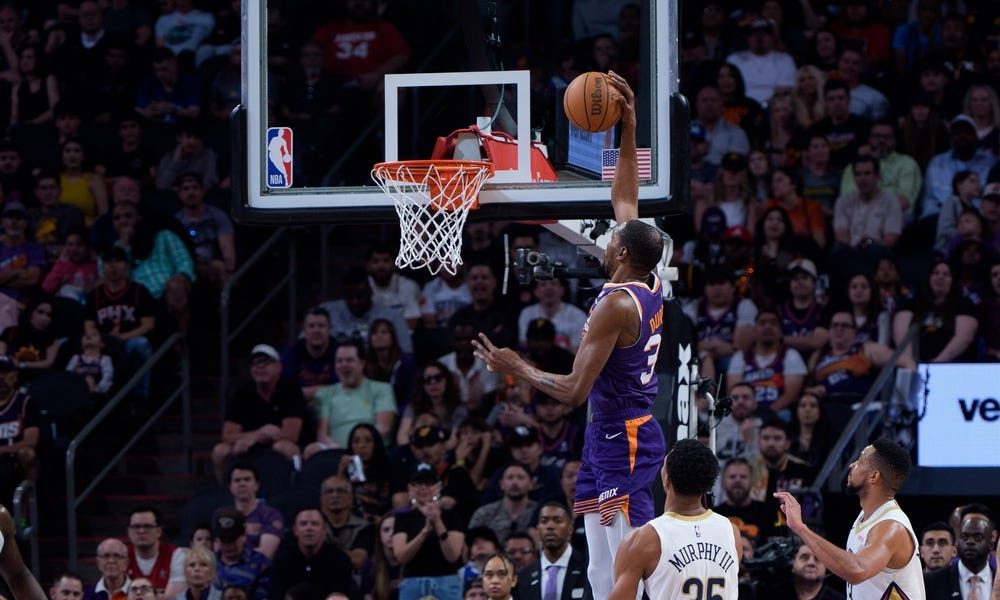Featured Articles
-

 14NHL Game Previews, Picks & Predictions
14NHL Game Previews, Picks & PredictionsCanucks vs Predators Prediction, Pick, Preview & Betting Odds for 4/26/24
-

 14MLB Game Previews, Picks & Predictions
14MLB Game Previews, Picks & PredictionsDodgers vs Blue Jays Prediction, Pick, Preview & Betting Odds – MLB 4/26/24
-

 25NBA Game Previews, Picks & Predictions
25NBA Game Previews, Picks & PredictionsClippers vs Mavericks Prediction, Pick, Preview & Betting Odds for 4/26/24
What’s Hot
-

 12NHL Game Previews, Picks & Predictions
12NHL Game Previews, Picks & PredictionsRangers vs Capitals Prediction, Pick, Preview & Betting Odds for 4/26/24
In this NHL regular season prediction between the Rangers and Capitals, see who like...
-

 13MLB Game Previews, Picks & Predictions
13MLB Game Previews, Picks & PredictionsRays vs White Sox Prediction, Pick, Preview & Betting Odds – MLB 4/26/24
Check out our free Rays vs White Sox pick and preview for this MLB...
-

 15MLB Game Previews, Picks & Predictions
15MLB Game Previews, Picks & PredictionsCubs vs Red Sox Prediction, Pick, Preview & Betting Odds – MLB 4/26/24
Check out our free Cubs vs Red Sox pick and preview for this MLB...
Latest Knup Sports Show
Latest Posts at KnupSports.com
-

 5MLB Game Previews, Picks & Predictions
5MLB Game Previews, Picks & PredictionsPirates vs Giants Prediction, Pick, Preview & Betting Odds – MLB 4/26/24
Check out our free Pirates vs Giants pick and preview for this MLB matchup at Oracle Park. See who we like to...
-

 17MLB Game Previews, Picks & Predictions
17MLB Game Previews, Picks & PredictionsDiamondbacks vs Mariners Prediction, Pick, Preview & Betting Odds – MLB 4/26/24
Check out our free Diamondbacks vs Mariners pick and preview for this MLB matchup at T-Mobile Park. See who we like to...
-

 19MLB Game Previews, Picks & Predictions
19MLB Game Previews, Picks & PredictionsPhillies vs Padres Prediction, Pick, Preview & Betting Odds – MLB 4/26/24
Check out our free Phillies vs Padres pick and preview for this MLB matchup at PETCO Park. See who we like to...
-

 21NHL Game Previews, Picks & Predictions
21NHL Game Previews, Picks & PredictionsJets vs Avalanche Prediction, Pick, Preview & Betting Odds for 4/26/24
In this NHL regular season prediction between the Jets and Avalanche, see who like to win the game and cover the puck...
-

 13MLB Game Previews, Picks & Predictions
13MLB Game Previews, Picks & PredictionsTwins vs Angels Prediction, Pick, Preview & Betting Odds – MLB 4/26/24
Check out our free Twins vs Angels pick and preview for this MLB matchup at Angel Stadium of Anaheim. See who we...
-

 14NHL Game Previews, Picks & Predictions
14NHL Game Previews, Picks & PredictionsCanucks vs Predators Prediction, Pick, Preview & Betting Odds for 4/26/24
Read our Canucks vs Predators prediction for this NHL regular season game in Nashville. Check out who we like to win and...
-

 12NHL Game Previews, Picks & Predictions
12NHL Game Previews, Picks & PredictionsRangers vs Capitals Prediction, Pick, Preview & Betting Odds for 4/26/24
In this NHL regular season prediction between the Rangers and Capitals, see who like to win the game and cover the puck...
-

 11MLB Game Previews, Picks & Predictions
11MLB Game Previews, Picks & PredictionsYankees vs Brewers Prediction, Pick, Preview & Betting Odds – MLB 4/26/24
Check out our free Yankees vs Brewers pick and preview for this MLB matchup at American Family Field. See who we like...
-

 11MLB Game Previews, Picks & Predictions
11MLB Game Previews, Picks & PredictionsReds vs Rangers Prediction, Pick, Preview & Betting Odds – MLB 4/26/24
Check out our free Reds vs Rangers pick and preview for this MLB matchup at Globe Life Field. See who we like...
-

 13MLB Game Previews, Picks & Predictions
13MLB Game Previews, Picks & PredictionsRays vs White Sox Prediction, Pick, Preview & Betting Odds – MLB 4/26/24
Check out our free Rays vs White Sox pick and preview for this MLB matchup at Guaranteed Rate Field. See who we...
-

 13MLB Game Previews, Picks & Predictions
13MLB Game Previews, Picks & PredictionsGuardians vs Braves Prediction, Pick, Preview & Betting Odds – MLB 4/26/24
Check out our free Guardians vs Braves pick and preview for this MLB matchup at Truist Park. See who we like to...
-

 14MLB Game Previews, Picks & Predictions
14MLB Game Previews, Picks & PredictionsCardinals vs Mets Prediction, Pick, Preview & Betting Odds – MLB 4/26/24
Check out our free Cardinals vs Mets pick and preview for this MLB matchup at Citi Field. See who we like to...
-

 15MLB Game Previews, Picks & Predictions
15MLB Game Previews, Picks & PredictionsCubs vs Red Sox Prediction, Pick, Preview & Betting Odds – MLB 4/26/24
Check out our free Cubs vs Red Sox pick and preview for this MLB matchup at Fenway Park. See who we like...
-

 14MLB Game Previews, Picks & Predictions
14MLB Game Previews, Picks & PredictionsDodgers vs Blue Jays Prediction, Pick, Preview & Betting Odds – MLB 4/26/24
Check out our free Dodgers vs Blue Jays pick and preview for this MLB matchup at Rogers Centre. See who we like...
-

 16MLB Game Previews, Picks & Predictions
16MLB Game Previews, Picks & PredictionsAthletics vs Orioles Prediction, Pick, Preview & Betting Odds – MLB 4/26/24
Check out our free Athletics vs Orioles pick and preview for this MLB matchup at Oriole Park at Camden Yards. See who...
-

 18MLB Game Previews, Picks & Predictions
18MLB Game Previews, Picks & PredictionsRoyals vs Tigers Prediction, Pick, Preview & Betting Odds – MLB 4/26/24
Check out our free Royals vs Tigers pick and preview for this MLB matchup at Comerica Park. See who we like to...
-

 25NBA Game Previews, Picks & Predictions
25NBA Game Previews, Picks & PredictionsClippers vs Mavericks Prediction, Pick, Preview & Betting Odds for 4/26/24
Check out our free Clippers vs Mavericks prediction for this NBA matchup in Dallas. See who we like to win and cover...
-

 19NBA Game Previews, Picks & Predictions
19NBA Game Previews, Picks & PredictionsBucks vs Pacers Prediction, Pick, Preview & Betting Odds for 4/26/24
Read our Bucks vs Pacers prediction for this NBA regular season game in Indianapolis. Check out who we like to win and...
-

 31Show Notes from Knup Sports Show
31Show Notes from Knup Sports ShowShow #217 – John Latella of On Demand Fantasy Sports
In this episode, we have a special guest, John Latella, who is the mind behind On Demand Fantasy Sports. John's journey is...
-

 54MLS Game Previews, Picks & Predictions
54MLS Game Previews, Picks & PredictionsPortland Timbers vs Los Angeles Prediction, Pick, Preview & Betting Odds – MLS 4/28/24
Check out our free Portland Timbers vs Los Angeles pick and preview for this MLS match in Los Angeles, CA. See who...









